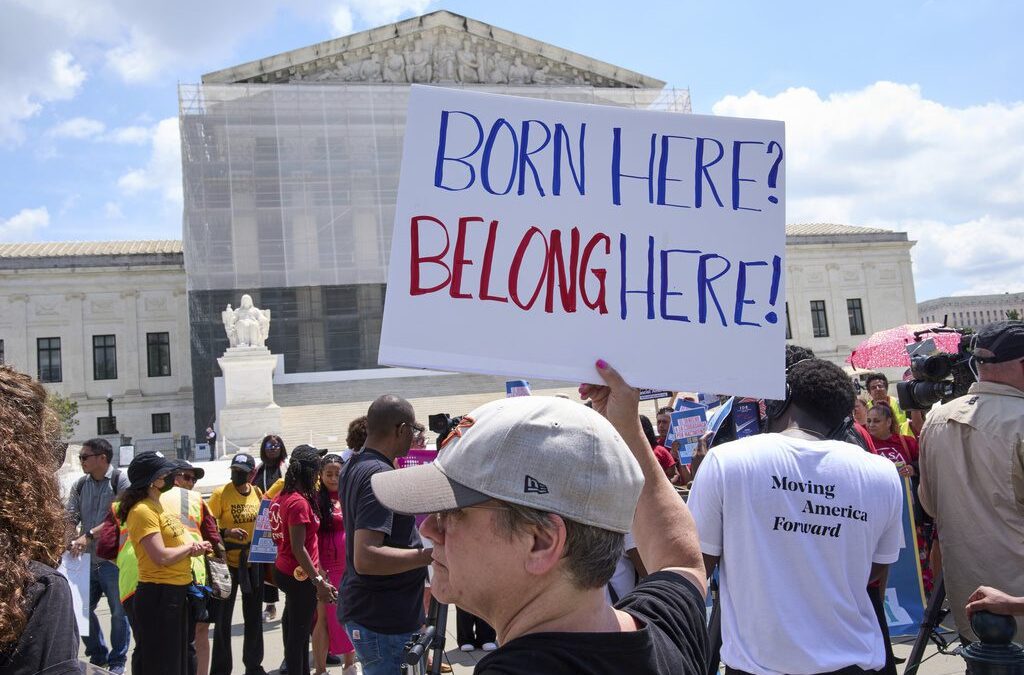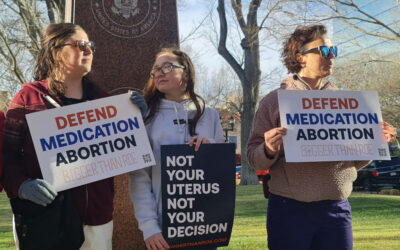
Photo credit: fizkes/Shutterstock
“We really are a safety net…but we can only do as much as our community allows us to.”
Josie Pinto’s team has been flooded with more calls than usual lately—and as people begin losing Medicaid coverage, she expects it’s only going to get worse.
“This week in particular has been a really busy, busy week,” said Pinto, co-founder and executive director of the Reproductive Freedom Fund of New Hampshire (RFFNH), the Granite State’s only fund to help women afford abortions. “I think we’re very much going to absorb a lot of the trickle down effects of it in the next coming months.”
On July 4, President Trump signed Republicans’ “Big Beautiful Bill”—which slashes funding for Medicaid, Title X, Supplemental Nutrition Assistance Program (SNAP), and other core public health and safety-net programs. Title X alone funds birth control, STI testing, cancer screenings, and other preventive services for low-income patients. Advocates say the bill will devastate access to basic reproductive and preventive care.
As Medicaid doesn’t fund abortions except in cases of rape, incest, or when the life of the pregnant person is in danger, Pinto said the irony of defunding this line of work is that it’s going to lead to more abortions.
“If we cut Medicaid funding for things like birth control, cancer screening, all these things, we’re going to have a much higher rate of unintended pregnancies,” she said. “And if those are Medicaid patients, that means that they don’t have the money to pay for an abortion. So higher unintended pregnancies with no money does mean we will see sort of a surge in need on our hotline.”
A target on basic care
Dr. Jamila Perritt, OB/GYN and president of Physicians for Reproductive Health, called the bill “one of the ugliest actions we have seen from the Trump administration to date.” In a July 1 statement, she warned that gutting programs like Medicaid, CHIP, SNAP, and Title X would “have horrible consequences for tens of millions of people.”
“As an OB/GYN, I am outraged that Congress has failed our patients, our advocates, and us as providers by passing legislation that shows such blatant disregard for basic health care access,” she said. “Experience has taught us that legislation like this is a direct attack on the health, dignity, and bodily autonomy of millions, with disproportionate impacts on those experiencing poverty, living in rural areas, Black and Indigenous People of Color, and those of LGBTQIA2S+ experience.”
Pinto echoed those concerns.
While RFFNH does not receive state or federal funding, it serves patients who do—and who are increasingly falling through the cracks. According to Pinto, more than half of the patients that RFFNH serves are on or qualify for Medicaid.
“They indicate they’re on some form of assistance, whether that’s SNAP or EBT, or other benefits,” Pinto said. “Some people call us because they have really high deductible plans, and they haven’t even touched their deductible…or maybe they have good health care, but they can’t share that they’re having an abortion with the person who has that policy, whether that’s their parents’ policy or it’s a partner’s policy. So there’s so many different reasons why people might be in a situation where they need us.”
RFFNH was created in 2019. Last year, the organization provided $183,000 in direct abortion funding, covering an average procedure cost of $937. The fund also assists with transportation, emergency contraception, and emotional support, according to its annual impact report.
RFFNH supported patients receiving care at 10 different clinics in 2024, including Equality Health Center, Dartmouth-Hitchcock, and the Joan G. Lovering Health Center.
Clinics already in crisis
At the Joan G. Lovering Health Center in Greenland, the downstream effects of the Republicans’ “beautiful bill” are already showing. The nonprofit clinic provides abortions, STI screenings, cancer prevention, and contraceptive care to patients, and staff are bracing for a wave of newly uninsured ones.
Sandi Denoncour, executive director of the center, said approximately 30% of their patients are on Medicaid in New Hampshire, Maine, or are uninsured altogether.
“Regardless of whether they’re actively connected to Medicaid or not, if they are uninsured and low income, we still see them,” she said. “And a fair portion, probably 25% of folks are on some sort of marketplace insurance plan.”
Denoncour added context for how New Hampshire’s reproductive care infrastructure has already absorbed major losses. Four years ago, New Hampshire’s Executive Council declined to renew Title X family planning contracts for all abortion providers in the state, cutting off longstanding federal and state funding to clinics like the Joan G. Lovering Health Center. Before that, Denoncour said, abortion providers delivered roughly 80% of family planning services across the state.
The local cuts forced the clinic to restructure, losing about a quarter of its operating budget. When more patients are uninsured or underinsured, donations have to make up the difference—and now, with similar funding losses playing out nationally under Trump’s policies, more health systems are competing for the same shrinking pool of resources.
Without public investment, she said, clinics are forced to rely on the choices of individual donors—making long-term planning increasingly difficult.
“Any time you restrict access to Medicaid-covered health care services, either through cuts in reimbursement or increased enrollment burdens and simultaneously disinvest in the safety net of service providers, there’s no outcome other than a devastating impact on health care for our lower income patients,” Denoncour said. “And we know these burdens will disproportionately impact communities of color and clearly disproportionately impact patients with the ability to become pregnant. The fact that we know that and we understand the long history of disinvestment in these populations makes doubling down on that disinvestment really unconscionable.”
While the clinic accepts Medicaid, cuts from the Republicans’ “big beautiful bill”may destabilize patients’ ability to keep that coverage. Denoncour said the loss of Title X, in particular, could gut programs that help patients afford IUDs, pills, and annual exams.
How long can the safety net hold?
With abortion procedures remaining available in New Hampshire up to 24 weeks, both Denoncour and Pinto are calling on Granite Staters to try to support local reproductive care infrastructure—not just in moments of political crisis, but consistently.
So far, RFFNH has managed to avoid turning anyone away. But Pinto said she can’t promise that will hold. With a $20,000 monthly operating budget and increasing competition for donor support, the pressure is building.
“We’re not going anywhere because we’re committed to continuing access to fight,” Pinto said. “But we really are a safety net. Think of us like health insurance where you chip in when you can. Then if you need us, we’re here. But we can only do as much as our community allows us to.”
New Hampshire may be among the first states to feel the shock of these federal cuts—but it won’t be the last. As national funding dries up and safety-net providers reach their limits, the future of abortion access may depend less on laws, and more on whether communities are willing—and able—to hold the line.

Supreme Court limits nationwide injunctions, but fate of Trump birthright citizenship order unclear
WASHINGTON (AP) — A divided Supreme Court on Friday ruled that individual judges lack the authority to grant nationwide injunctions, but the...

Trump administration revokes guidance requiring hospitals to provide emergency abortions
WASHINGTON (AP) — The Trump administration announced on Tuesday that it would revoke guidance to the nation's hospitals that directed them to...

Critics say proposed NH education bill pushes anti-abortion message through classroom videos
A bill making its way through the New Hampshire legislature would require schools to show a “high-quality computer-generated animation or...

House GOP fast-tracks budget bill that would cut off Medicaid funding to Planned Parenthood
The budget package proposes steep health care cuts—and includes a new push to block patients from accessing reproductive care. In a 30-24 party-line...

New Hampshire clinics lose Title X funding, threatening access to reproductive health care
Planned Parenthood of Northern New England is on Trump’s list of clinics to lose Title X funding. Every year, more than 11,000 New Hampshire...

Is “Live Free or Die” losing its meaning? One Granite Stater is worried about 3 proposed laws
Growing up in Manchester, Hannah Murphy made a piece of kindergarten art that her family had hanging in their den for two decades—in fact, it’s...





